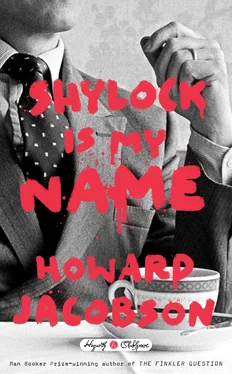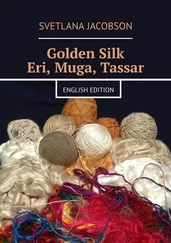If you prick us do we not bleed, but if we prick back do we not shed blood? — he would rather not know.
These famous ethics of ours have landed us in a fine mess, Shylock would like to say to his wife. If we cannot accept that we might murder as other men murder, we are not enhanced, but diminished.
Do you agree with me Leah, my love?
But it’s too late, and too cold to go outside. Always cold where she resides.
And anyway, he knows that Leah will point out the sophistry in the account of himself he has just offered Strulovitch. Antonio had been his to kill. “The law allows it, and the court awards it,” the little lawyer with the squeaky voice had told him. That was the moment when history was his to make, and never mind “I cannot tell you what the act of murder feels like because it didn’t come to that”: it didn’t come to that because he didn’t let it. Give me my money and I’ll go, he’d said instead.
Cowardice, was it? Or a pious adherence to Jewish law? The Almighty had fixed his canon against self-slaughter and self-slaughter it would assuredly have been had he shed a drop of Antonio’s blood.
Either way — faint-heartedness or piety — does this mark the limit beyond which a Jew, with all his brave talk of vengeance, dare not go?
No wonder Strulovitch, otherwise so eager to keep him to the mark, has chosen to fall asleep.
Despite the lateness of the hour and the cold, he goes outside to face Leah’s reproach after all. He had chosen to stay alive when there was nothing left for him to stay alive for. He could have killed his enemy and joined his wife. So why hadn’t he?
“Darling! I’ve rushed back. I wouldn’t even let them finish me.”
Anna Livia Plurabelle Cleopatra A Thing Of Beauty Is A Joy Forever Wiser Than Solomon Christine skipped into the room carrying a posy of hand-tied forget-me-nots and roses. She had a bandage over one eye, like a pirate. The rest of her was lipblistered.
“You look like a bridesmaid,” Beatrice cried, not knowing what else to say.
“Darling, I feel like a bridesmaid.”
She searched the bed sheets with her one good eye.
“You can’t be looking for blood?” Beatrice cried.
“Of course not. I’m looking for Gratan.”
Then she nodded interrogatively in the direction of the bathroom.
“He’s not here,” Beatrice said.
“You haven’t…?”
“No, no we haven’t…”
“So you are still…?”
“Yes, we are still. But he hasn’t been here much since we arrived.”
“That was only yesterday, wasn’t it?”
“Correct. He’s done a lot of nipping down and slipping out in that time. He’s just popped off again. I’m not sure why.”
“Maybe he’s making arrangements.”
“What for?”
Plurabelle made as though to wink at her. “You know.”
Beatrice scowled. “I can’t promise you a wedding any time soon,” she said.
The expression of disappointment that swept across Plurabelle’s beleaguered face made Beatrice doubt the resolutions she had made the night before in Gratan’s absence. He had come home, as he had promised, at a reasonable hour — supposing there was any reasonable hour for a man in his position to be out until — and, again as he had promised, as sober as a newt. But she had decided not to stay awake — and then, in a coup de théâtre, not to stay alive for him.
It did occur to her to wonder, as she lay there listening to the boards creaking outside the bedroom, that it could have been her father come to rescue her. In which case — but no, she decided against covering her nakedness. Let them all see what they had done to her. And how well she could perform it.
In the event it was Gratan.
That bloody father of hers. Never there when you wanted him.
She’d had a strange evening, lying there on pillows as fluffed as Plury’s lips, sipping champagne like a thirsty bee, alternating glugs with macarons, and thinking about life’s paradoxes.
However much of a fight she’d put up against her father’s covenantal obsessions — a fight that seemed to her to have gone on all her short life — in some corner of her soul she respected them. Them, or her father’s fanatic embrace of them? She wasn’t sure that a bridal bower lent to her by Plury was conducive to the making of such fine distinctions. But she had read about hostages falling in love with their captors and their captors’ ideologies, and she did wonder if that was what had happened to her — the captor being her father, not Gratan. Explain it she could not, and approve it she could not either, but now that the argument with her father had finally boiled over into flight, she saw him differently and thought he might be right. Not right in how he’d brought her up, exactly, but right in how he hadn’t. She had girlfriends she could easily have envied for their freedom to come and go as they pleased. One, the daughter of atheists, had been sleeping with her boyfriend in the next room to her easy-thinking parents since she was thirteen. Another, the child of poets, was allowed to throw parties at her own home — parties her mother and father and even her grandparents attended — at which substances that Beatrice had never heard of were ingested through parts of the body she had never seen, and sexual practices she would not have thought practicable were openly encouraged.
So why didn’t she envy them? Queer for her to hear herself say this but the reason she didn’t envy them was that they lacked example. They swung free like gates come off their hinges, whereas she had had to learn resistance. Better your father be your adversary than your friend, she reasoned.
Don’t waste yourself on chthonic arseholes, Beatrice, he’d told her. Wasn’t she lucky having a father who thought like that? Less lucky, she thought, having a father who distinguished between Jewish chthonic arseholes and Gentile chthonic arseholes and measured the time she wasted on them differently. Wasn’t waste waste?
She had never been happy with the Jew thing. “It’s such a horrible little word,” she remembered saying to her parents when she was just a little girl. “ Jew . It sounds like a black beetle with spikes.”
It was her mother who had smacked her then. Her father, she recalled, had laughed.
“So if we don’t do Jewish things, and we don’t have Jewish friends, and we don’t eat Jewish food, and we don’t celebrate Jewish festivals, why must I go out with Jewish boys?” she asked him later.
“For the sake of continuity,” he told her.
“What do you want me to continue?”
“The thing you were born to be.”
“Jewish?”
“Continuous.”
“I just don’t know what that means.”
“Neither do I. But I do know you weren’t born to toss yourself aside. You aren’t random, Beatrice. You didn’t begin with yourself so you can’t end with yourself. Life is a serious business. You can’t be shaken by every passing fancy.”
You aren’t a gate that’s come off its hinges.
And now, to preserve that continuity — though he wouldn’t be genuinely continuous even then — her Gentile chthonic arsehole boyfriend has to bleed. Maybe bleed to death. Explain to me how that works, Daddy…
He might love me but he’s a butcher, Beatrice thought. His mind’s an abattoir.
—
“So what’s wrong?” Plurabelle wanted to know.
And Beatrice told her.
—
It was important to D’Anton, when it came to helping friends, to be even-handed. He now had two things to do for Barnaby. Get him the Solomon Joseph Solomon sketch and lie to Plury for him about his ring. So what two things could he do for Gratan? Extricate him from the mess with Beatrice was one, but Gratan appeared to have his heart set on the girl. Get Strulovitch to relent was a second, but he didn’t immediately see how he was going to achieve that. Apart from Beatrice herself, he had nothing that Strulovitch wanted. And even if he found a way of prising her from Gratan and delivering her back to her father, what would that achieve for Gratan? Procuring a top-class surgeon to perform the operation — say the surgeon who attended to royal circumcisions, assuming they were still performed — was of course a third, but his gorge rose at the prospect of being in any way instrumental in this. I am not going to pimp for that Jew, he decided.
Читать дальше












